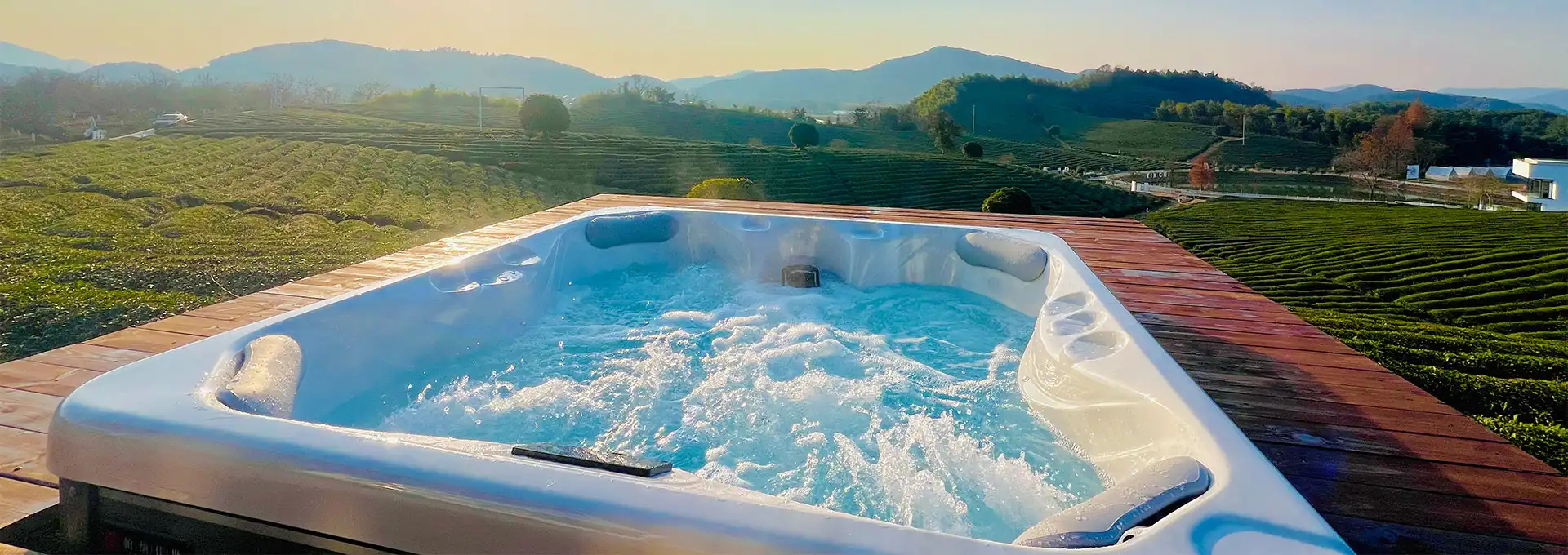Why Does My Hot Tub Feel Gritty?
Having an outdoor hot tub is a luxurious experience that can provide relaxation and enjoyment for homeowners. However, one issue that can arise is gritty water, which can be both unpleasant and potentially harmful to the hot tub's components. If you've noticed your hot tub water feeling gritty, it's essential to address the problem promptly to ensure the longevity of your investment and maintain a comfortable soaking experience.
What Causes Gritty Hot Tub Water?
Gritty hot tub water can be caused by various factors, including:
1. Improper water chemistry: Maintaining the correct water chemistry is crucial for a hot tub's operation. If the pH levels, alkalinity, or calcium hardness is out of balance, it can lead to the formation of scale or mineral deposits, which can make the water feel gritty. Specifically, high pH levels can cause calcium and other minerals to precipitate out of the water, forming scale and grit. Low pH levels, on the other hand, can lead to corrosion of the hot tub's components, releasing metal particles into the water.
2. Sediment buildup: Over time, sediment from sources such as dirt, debris, or organic matter can accumulate in the hot tub's plumbing and filtration system. This buildup can contribute to the gritty sensation when the water circulates. Sediment can enter the outdoor hot tub through various means, such as wind-blown debris, bathers carrying in dirt or sand on their bodies, or even through the source water used to fill the tub.
3. Biofilm formation: Biofilm is a slimy layer of microorganisms that can form on the hot tub's surfaces. As it builds up, it can break off and create a gritty texture in the water. Biofilm thrives in environments with poor water chemistry, inadequate sanitization, and high levels of organic matter.
4. Hard water: Areas with hard water (high mineral content) can exacerbate the problem of gritty hot tub water. The minerals, primarily calcium and magnesium, can precipitate and form deposits, leading to a sandpaper-like feeling. Hard water can also contribute to scale formation on surfaces, which can eventually break off and contribute to the gritty sensation.
5. Aging hot tub components: As hot tub components age, they can deteriorate and shed small particles into the water, creating a gritty sensation. This can be particularly problematic with older hot tubs or those that have not been properly maintained.
6. Bather load: The number of people using the hot tub can also play a role in gritty water. A higher bather load can introduce more organic matter, oils, and other contaminants into the water, potentially leading to biofilm formation and gritty buildup over time.
How to Remove Grit from a Hot Tub?
If you're experiencing gritty water in your outdoor hot tub, there are several steps you can take to address the issue:
1. Drain and clean the hot tub: Start by draining the hot tub completely and giving it a thorough cleaning. Use a hot tub cleaner or a mixture of water and vinegar to scrub down the surfaces, removing any buildup or biofilm. Pay special attention to areas where grit and scale tend to accumulate, such as the jets, filter compartments, and around the waterline.
2. Clean the filtration system: Remove and clean the hot tub's filters, as well as the skimmer basket and pump basket. This will help eliminate any trapped sediment or debris. It's recommended to replace the filters periodically, as they can become clogged and ineffective over time, contributing to water quality issues.
3. Perform a system flush: A system flush involves circulating a cleaning solution through the hot tub's plumbing and jets to remove any buildup or deposits. Follow the manufacturer's instructions or seek professional assistance for this process. Some specialized flushing products are designed to dissolve scale and mineral deposits, helping to remove gritty buildup more effectively.
4. Check and adjust water chemistry: Test the water chemistry and make necessary adjustments to bring the pH, alkalinity, and calcium hardness levels into the recommended ranges. This will help prevent further mineral buildup and scale formation. Maintaining proper water chemistry is crucial for preventing gritty water and ensuring the overall health of your hot tub system.
5. Consider a metal remover or scale remover: If the gritty sensation persists, you may need to use a specialized metal remover or scale remover product designed for hot tubs. These products can help dissolve and remove stubborn mineral deposits, as well as any metal particles that may be contributing to the gritty feel.
6. Shock treatment: After completing the cleaning and balancing processes, it's recommended to shock the outdoor hot tub with an oxidizing agent, such as chlorine or non-chlorine shock. This will help eliminate any remaining organic matter and ensure a fresh start with clean water.
7. Rinse thoroughly: Once the cleaning and shocking processes are complete, it's essential to rinse the hot tub thoroughly to remove any residual cleaning products or dissolved contaminants. Failing to rinse properly can lead to further water quality issues and potential skin or eye irritation for bathers.
How to Prevent Gritty Hot Tub Water?
While addressing gritty water is essential, preventing the issue from recurring is even more crucial. Here are some tips to help maintain clean and comfortable hot tub water:
1. Regular water testing and balancing: Establish a routine for testing and adjusting the water chemistry. This will ensure that the pH, alkalinity, and calcium hardness levels remain within the ideal ranges, preventing mineral buildup and scale formation. It's recommended to test the water at least once a week and make adjustments as needed.
2. Proper filtration and circulation: Ensure that your hot tub's filtration system is functioning correctly and that the water is circulating adequately. Regular filter cleaning and replacement will help remove any sediment or debris that could contribute to gritty water. Additionally, running the jets and circulating the water regularly can help prevent stagnation and buildup.
3. Shock treatment: Regularly shock-treating your hot tub with an oxidizing agent, such as chlorine or non-chlorine shock, can help break down organic matter and prevent biofilm formation. Follow the manufacturer's recommendations for shock treatment frequency, typically once a week or as needed based on bather load and usage.
4. Use a outdoor hot tub clarifier or enzyme product: These products can help remove particles and organic matter from the water, keeping it clear and preventing gritty buildup. Clarifiers work by clumping together small particles, making them easier to filter out, while enzymes break down organic matter that can contribute to biofilm formation.
5. Drain and refill periodically: Even with proper maintenance, it's recommended to drain and refill your hot tub every 3-6 months, depending on usage. This helps remove any accumulated contaminants and ensures fresh, clean water. During this process, it's also a good idea to clean and inspect the hot tub components for any signs of wear or damage that could contribute to gritty water.
6. Install a water softener or use a scale control product: If you live in an area with hard water, consider installing a water softener or using a scale control product specifically designed for hot tubs. These can help prevent mineral buildup and scale formation, which can lead to gritty water over time.
7. Cover the hot tub when not in use: Keeping the hot tub covered when not in use can help prevent dirt, debris, and other contaminants from entering the water, reducing the risk of gritty buildup. It also helps maintain water temperature and chemical levels, reducing the need for frequent adjustments.
8. Implement a bather hygiene protocol: Encourage bathers to shower before entering the hot tub to remove any dirt, oils, or lotions from their bodies. This can help minimize the introduction of contaminants that can contribute to biofilm formation and gritty water.
9. Perform regular maintenance: In addition to water testing and chemical adjustments, it's essential to perform regular maintenance tasks such as cleaning the filter cartridges, skimming the water surface, and checking for any signs of wear or damage to the hot tub components. Addressing issues promptly can prevent them from escalating into more significant problems, including gritty water.
10. Consider professional outdoor hot tub servicing: If you're experiencing persistent issues with gritty water or other water quality problems, it may be beneficial to enlist the help of a professional hot tub service provider. These professionals have the expertise and specialized equipment to thoroughly clean and maintain your hot tub, ensuring optimal water quality and longevity of the system.
By following these preventative measures and addressing the issue promptly when it arises, you can enjoy a comfortable and grit-free hot tub experience for years to come.
If you want to get more information about this product, you can contact us at info@iparnassus.com!
References:
1. "Why Does My Hot Tub Feel Gritty?" Hot Tub Works
2. "How to Remove Grit from Hot Tub Water," Hot Tub Club
3. "Causes of Gritty Hot Tub Water," Hot Tub Covers Canada
4. "How to Prevent Gritty Hot Tub Water," Spa Depot
5. "Dealing with Gritty Hot Tub Water," Bullfrog Spas
6. "Troubleshooting Hot Tub Water Problems," Hot Spring Spas
7. "Hot Tub Maintenance Guide: Keeping Your Water Clean and Clear," Jacuzzi
8. "How to Remove Scale and Mineral Buildup in Your Hot Tub," Aqua Leisure
9. "Hot Tub Water Chemistry 101," Sundance Spas
10. "Preventing Hot Tub Water Problems," Master Spa Parts
Send Inquiry
Related Industry Knowledge
- Are Chemicals Making My Hot Tub Foamy?
- Can You Go in a Hot Tub with Poison Ivy?
- What Type of Maintenance Does a Swim Spa Need?
- Can You Go in a Hot Tub While on Antibiotics?
- What are Hot Tubs Used For?
- Can You Put Bath Bombs in a Hot Tub?
- How to Regulate Water Level in Swimming Pool Spa?
- Can you exercise in a large hot tub?
- How to Unlock Caldera Spa Control?
- How to Operate Spa Valves on Swimming Pool Piping?
_1768872582663.webp)


